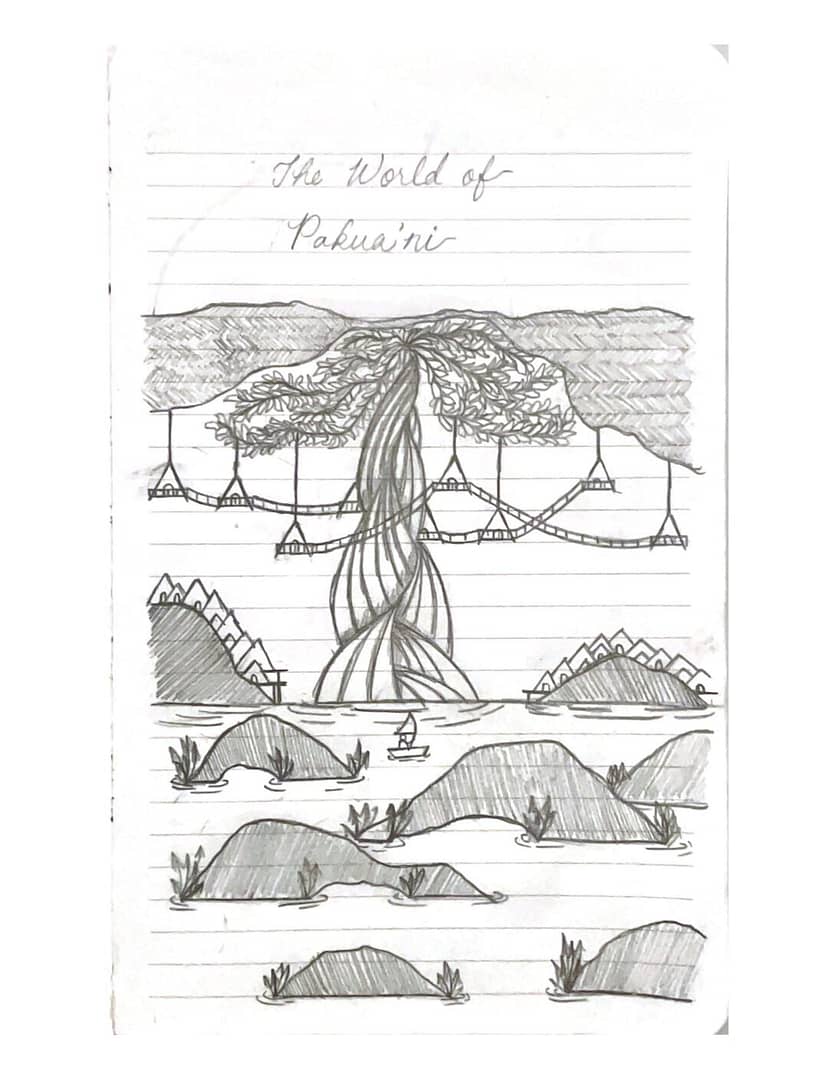

Beyond
Someone muses about their underground society centered sustained by a massive tree
Story
I slowly start looking up. Still darkness. At this point, I can tell the Great See’ba begins. No one knows what it’s made of. All we know is it’s rocky, black, and most importantly, impenetrable. It covers the entire expanse of what we know as our world, shrouding it in darkness. The Gula’ni say there’s another world on the other side of it. They even go as far as to say our people lived on the other side once long ago—that we are somehow descendants of them. It seems impossible to imagine a life like that. It’s dizzying yet intriguing. I think back to it frequently because it reminds me how little I, or, frankly, even anyone else I know in Pakua’ni, know about our world.
At this point, I am looking directly above me. Right at the See’ba. All my life I have only ever known this ceiling. Sometimes I feel its crushing weight. And yet, what holds it up? No one asks. The Gula’ni say we shouldn’t question things we don’t need answers to. We should be grateful the See’ba stays as such and protects us. From what? No one asks either. Most people simply follow what the Gula’ni say—blindly, partly afraid of repercussions and partly afraid of what they don’t know. The darkness blinds us all. It’s suffocating.
From the corner of my eye, I can notice a strong glow. I know what it is. That familiar warm hue and intensity that, along with the See’ba, has been a constant my entire life. I turn my head completely to the other side while closing my eyes and covering them with my hands. I rub each eye a bit before I let my hand down and open them again. Almost instantly, Ar’per comes into focus. Its massive, twisting trunk juts out of the water as if it pierced through it ruthlessly, reaching for the one area in the See’ba where the only light in Pakua’ni is seen. The light emanates from a circle about as wide as the trunk of Ar’per. This area is not black like the rest of See’ba but rather a mostly clear material. It’s still impenetrable. Some radicals, as the Gula’ni say, have tried to pierce the Shi’ra only to fall to their demise.
Right as the trunk of Ar’per tapers into a sharp point and seems to pierce the Shi’ra, it stops. The trunk spreads out into a plethora of branches and a foliage so green like no one has seen. In fact, nothing else in our world looks as green as the leaves of Ar’per. There may not even be another instance of green besides these leaves. Its branches twist and spread along the Shi’ra and the surrounding See’ba as if trying to collect all the light it can, but nothing, not even Ar’per, can capture all of it. The light seeps through the leaves and the branches of Ar’per and lands on the water and extends as far as it can before it becomes one with the darkness.
On these branches live the Gula’ni. They say by living close to the light, they can communicate with the ancestors from beyond. Only the selected few, those who have had the Vision, the Dri’sha, can rise and become a G’ula. This vision is supposedly seen at birth, and a child who is said to have seen the vision is said to develop differently. How so, almost no one knows, for as soon the G’ula find out, they immediately take the child from its parents and raise it on the branches of Ar’per. That child will never again interact with any other ordinary P’akua, who live on the giant roots of Ar’per that twist and turn in and out of the water. The majority of the Pakua’ni have built their livelihoods on these roots. They go about their duties, spiritual and vocational, while listening to the messages of the Gula’ni from above.
My father was a G’ula. Unfortunately for him, he made the mistake of being bested by his own curiosity. He broke with sacred Gula’ni doctrine and travelled down from the tops of Ar’per to wander among the Pakua’ni. He met and then, subsequently, fell in love with a woman, who later became my mother. Together, my father and mother raised me secretly for many years, hoping the G’ulani never find out, but it was inevitable that they would. On the count of heresy, they ordered the Plasha’ni, the spiritual guards of Pakua’ni, to execute my father and mother. I turned sixteen that day. I remember the Pl’asha guard who looked at me, staring as if seeing right through me, knowing me better than I knew myself, and let me live. Why? Why let me live with this burden? “Don’t question things you don’t need the answers to,” I would hear myself murmur.
I take it all in one last time. There is nothing left in this world for me anymore. I turn my boat around and row out into the dark.
Author’s Notes

Leave a Reply
You must be logged in to post a comment.